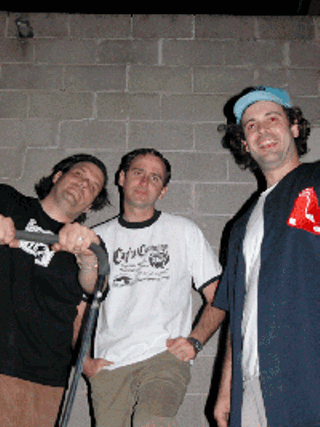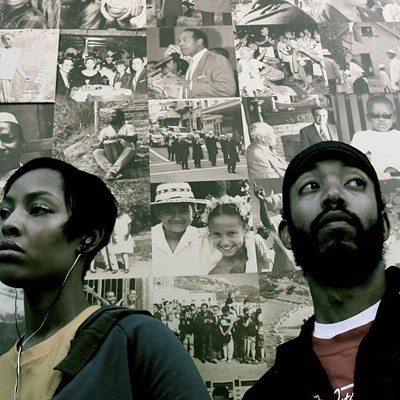We arrive a few minutes too late to catch a one-off cover of Bob Dylan's "Isis," but just in time to listen to the band meander through a new song, getting lost somewhere along the way. During the next tune, drummer Justin Donaldson is all smiles as singer/guitarist John Polle rips off a nearly prog-esque solo, while Naiman's Crumar synthesizer blasts out a sequence of boogie-ish chords. Eventually, Polle's guitar erupts in noisy squalls, and the song comes to an end, with Naiman calling out, "We forgot our choreography!"
Welcome to The Solace Bros.' world, where most everything, it seems, is the result of a happy accident.
After the band runs through another song or two, we sit down in the studio's lounge, appropriate since the band and the studio itself are inextricably linked. Though Donaldson and Naiman were in a band together in the early '90s (Pinata, whose EP garnered a notorious zero-stars-review in the Weekly), it was here that Polle and Naiman got to know each other, after each served as intern for Waters.
In 1999, as Naiman's internship was ending (due to, among other things, his accidental breaking of a rather expensive microphone and crashing into Waters' car) and Polle's was beginning, Naiman moved into the section of the building that became The Water Closet, with a partner. After that partner was unable to pay his share of the rent, he bailed, leaving Naiman his Crumar synth--which would later become integral to The Solace Bros.' sound--as payment.
Polle, meanwhile, had always wanted a baritone guitar--another essential Bros. element, as it would turn out--and his wife eventually bought one for him as a gift. The two began tracking quiet acoustic songs ("Our original concept was that we would be able to play nursing homes," says Polle, with Naiman adding, "day care centers, anywhere") but their sound kept getting louder. The duo pressed up 100 copies of a CD demo as a duo before finally enlisting Donaldson--"No. 1 in my drummer Rolodex," according to Naiman. With Donaldson on board, the band got louder still, ultimately easing into their current, full-blown power-trio sound.
Part of what makes the band unique is the intertwining of the Crumar and the baritone guitar parts (and the lack of a bass player). It is, if somewhat unorthodox, positively sublime--the trading back and forth between chords and notes, rhythm and melody, until it's difficult to tell what sounds are emanating from which instrument. But Naiman claims the band's songs are deceptively simple: "The idea when we started was basically to do stuff that's easy. We're doing simple things, and counteracting stuff, and I think both of us really ... "he pauses, "listen."
"I think that's almost the key to our songwriting," Naiman continues, "that we'll come in with ideas, or we'll be working on a part in rehearsal, but it's nothing that's super-precious, like 'I wrote this!' It's totally malleable."
Also listening is Waters, who in addition to producing both the band's official first EP, Discover!!!, and brand-new full-length, I Think of You (both on Water Closet Sounds), provides a useful, honest sounding board for the group.
"He's here a lot," says Polle, "so he'll come over after we work on a song for a while, and say, 'Yeah, that's a good part, but why are you doing this other part?' And he's really kind of brutal about it sometimes, but it's good, because there are plenty of people that tell you, 'Yeah, that's great.' ... He really understands the subtleties of songs."
In fact, Waters has even helped write lyrics for some of the band's songs, as well as sonically steering others in a completely different direction than their original incarnation.
"He really prods it, which helps," says Naiman. "And, of course, sometimes pisses us off." But their respect and gratitude for Waters' input is unmistakable.
Lyrically, the Bros. also try to keep things relatively simple, with both Polle and Naiman professing a love for clichés, though they generally tend to subvert them in some way (e.g., "We're just blowing smoke on our own parade," from "Cactus Factory"). And they're also not above throwing some humor in for good measure. For proof, check out the (ostensibly) tender love song "Pittsburgh Steamers" (hint: It's not named after a defunct sports team).
But it's the band's deftly seamless integration of musical styles (funk, new wave, classic rock, surf, art rock, etc.)--while still retaining a distinctive style of their own--that is perhaps most impressive.
"We understand that at this point, pretty much everything's been done in music," says Polle, "and our idea was to just steal from enough people that you can kind of cover your tracks, in a way. There's something that I've noticed that a lot of bands are doing these days, and that's stealing from just one band. And they may only be 20, 25 years old, but they should at least steal from two bands," he laughs. "That's my recommendation for all new bands."
Additionally, the music of The Solace Bros. emanates a certain wide-eyed exuberance, a joyfulness that is lacking in much of today's music. It is, by design, genuinely uplifting, with irresistible, smile-inducing pop melodies at every turn.
"We talk about how fuckin' sad all this music is," says Naiman, "and how (to us) music is about joy--not all of it, but a lot of the stuff that we connect over and like is sort of joyful."
Says Polle, "Someone in San Francisco told us that we sounded like Black Sabbath and The Archies," an assessment that the trio clearly relishes.
"And it's hard to play sad music without a bass player," laughs Donaldson.
"The thing about playing live," says Polle, "is that it actually is a pleasure. In fact, the older I get, and the more I've been involved with more of the mundane things in this world, the more I realize that that's a great thing to get to do."











